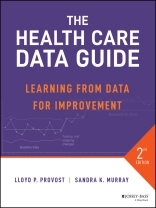An Essential text on transforming raw data into concrete health care improvements
Now in its second edition, The Health Care Data Guide: Learning from Data for Improvement delivers a practical blueprint for using available data to improve healthcare outcomes. In the book, a team of distinguished authors explores how health care practitioners, researchers, and other professionals can confidently plan and implement health care enhancements and changes, all while ensuring those changes actually constitute an improvement.
This book is the perfect companion resource to The Improvement Guide: A Practical Approach to Enhancing Organizational Peformance, Second Edition, and offers fulsome discussions of how to use data to test, adapt, implement, and scale positive organizational change.
The Health Care Data Guide: Learning from Data for Improvement, Second Edition provides:
* Easy to use strategies for learning more readily from existing health care data
* Clear guidance on the most useful graph for different types of data used in health care
* A step-by-step method for making use of highly aggregated data for improvement
* Examples of using patient-level data in care
* Multiple methods for making use of patient and other feedback data
* A vastly better way to view data for executive leadership
* Solutions for working with rare events data, seasonality and other pesky issues
* Use of improvement methods with epidemic data
* Improvement case studies using data for learning
A must read resource for those committed to improving health care including allied health professionals in all aspects of health care, physicians, managers, health care leaders, and researchers.
İçerik tablosu
Chapter 1. Introduction: What are the critical issues in supervision?
Chapter 2. What is the appropriate professional relationship between supervisor and supervisee?
Chapter 3. Who is ultimately responsible for patient care?
Chapter 4. Understanding unethical issues in clinical supervision
Chapter 5. Resolving unethical issues in clinical supervision
Chapter 6. Criticial issues in training supervisors and supervisees
Chapter 7. Skills in dealing with incompetent supervisors
Chapter 8. Skills in dealing with challenging supervisees
Chapter 9. Resolving other supervisee challenges: ineffective treatment
Chapter 10. Placing supervision in context: How the organizational system affects the quality of supervision
Chapter 11. Conclusions: Whad do we now know about resolving critical issues in supervision?
Yazar hakkında
LLOYD P. PROVOST is a cofounder of Associates in Process Improvement, the developers of the Model for Improvement roadmap and the Quality as a Business Strategy template for focusing organizations on improvement. Lloyd is a senior fellow at the Institute for Healthcare Improvement, where he supports the use of data for learning in programs.
SANDRA K. MURRAY is a principal in Corporate Transformation Concepts, an independent consulting firm. She is faculty for the Institute for Healthcare Improvement’s year-long Improvement Advisor Professional Development Program and their Breakthrough Series College. Sandra has taught numerous programs through the National Association for Healthcare Quality. Her cohort of client organizations encompasses the spectrum of health care delivery.












